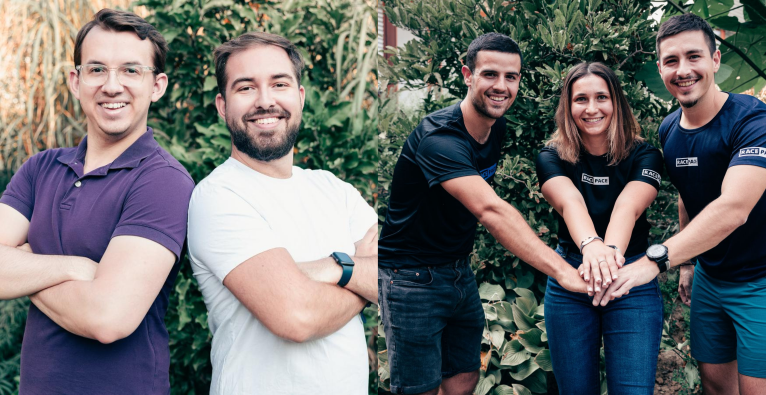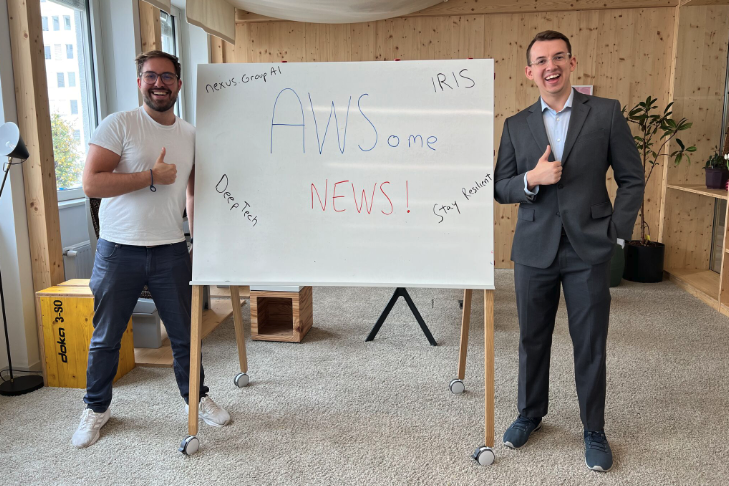✨ AI Kontextualisierung
1. Eckpfeiler der Kultur festlegen und Rahmenbedingungen dafür schaffen
Was wollen wir erreichen? Warum gibt es uns, und was ist unser Auftrag? Diese grundlegenden Fragen sollten von den Gründern klar beantwortet werden können. Dabei geht es nicht nur darum, was realistisch erscheint, sondern auch darum, sich zu trauen, groß zu denken.
Sobald diese Zukunft klar(er) ist, wird es entscheidend, die Kultur zu definieren, die es braucht, um dorthin zu gelangen. Welche Art von Mitarbeitenden benötigen wir, um diese Vision zu verwirklichen? Welche außergewöhnlichen Eigenschaften sollten sie mitbringen? Diese Überlegungen sind der Grundstein dafür, die richtigen Rahmenbedingungen zu schaffen – Rahmenbedingungen, die es diesen Menschen ermöglichen, sich im Unternehmen voll zu entfalten. Das beginnt bei den Büroräumlichkeiten und endet bei den Freiheitsgraden, die sie im Job haben.
Wenn die Eckpfeiler der Unternehmenskultur festgelegt sind, muss kompromisslos nach den passenden Mitstreitern gesucht werden, und die Rahmenbedingungen sollten konsequent auf sie abgestimmt werden – oder umgekehrt. Es ist sinnlos, hier Kompromisse einzugehen, nur um eine Position schnell zu besetzen. Ebenso wenig sinnvoll ist es, eine Arbeitsumgebung zu schaffen, in der die Gründer sich wohlfühlen, die jedoch nicht für die Mitarbeitenden förderlich ist oder nicht die Art von Menschen anzieht, die für das Erreichen der Unternehmensziele benötigt werden.
Meine Erfahrung mit Scale Ups: Je konsequenter und zielgerichteter dieser Prozess gestaltet wird, desto schneller lässt sich der Fortschritt realisieren. Ich habe einige Scale-ups erlebt, die genau an dieser Stelle ins Stocken geraten sind: Entweder waren sie sich über die notwendige Unternehmenskultur nicht im Klaren, haben Quantität vor Qualität gestellt oder waren schlicht nicht attraktiv genug für die Zielgruppe, die sie eigentlich anziehen wollten.
2. Personelles Wachstum
Spätestens jetzt rückt die Personalabteilung in den Fokus. Sie muss stets leicht überbesetzt sein – sowohl quantitativ als auch qualitativ –, um nicht zum Flaschenhals für das gesamte Unternehmen zu werden. Sobald die Personalabteilung ins Straucheln gerät, wird es im ganzen Unternehmen spürbar: Es werden zu wenige Mitarbeitende eingestellt oder die Auswahlverfahren sind zu oberflächlich. Häufig leidet auch das Onboarding! Es ist entweder zu kurz oder unzureichend, was zu einer hohen Ausfallquote während dieser Phase führt.
Meine Erfahrung mit Scale Ups: Wenn die Verantwortlichen in der Personalabteilung mit dem Unternehmen gewachsen sind, kennen sie die Unternehmenskultur zwar sehr gut, verfügen jedoch oft nicht über das notwendige Wissen und die Erfahrung im professionellen Personalmanagement. Hier können externe Expert:innen vom Markt weiterhelfen. Sie können auf Teilzeitbasis oder als Berater:innen auf Zeit ins Unternehmen geholt werden, um sofort mit anzupacken und gleichzeitig ihr Know-how mit den bestehenden Mitarbeitenden zu teilen. Diese temporäre Unterstützung hat sich oft als entscheidender Faktor erwiesen, um qualifizierte Mitarbeiter:innen rechtzeitig an Bord zu holen und langfristig zu halten.
3. Leadership-Kompetenz rasch und kontinuierlich aneignen
In der Startphase eines Unternehmens reicht es aus, eine gute Idee zu haben, das Produkt und den Markt zu entwickeln und Investoren zu überzeugen. Das Team ist überschaubar, die Kommunikationswege sind kurz und alle sind hochmotiviert. Doch sobald das Unternehmen wächst und die Anzahl der Teams zunimmt, wird häufig mit Führungs-Halbwissen improvisiert – und das bremst den Fortschritt. Die Führungskräfte sind überfordert, der Stresspegel steigt und mühsam gefundene Mitarbeiter:innen verlassen das Unternehmen, da sie sich nicht ausreichend geführt und gefördert fühlen. Deshalb ist es entscheidend, frühzeitig Maßnahmen zu ergreifen, um diese Führungslücke zu schließen.
Meine Erfahrung mit Scale Ups: Aus meiner Sicht wird hier oft viel zu lange gezögert, da die Bedeutung von professioneller Führung unterschätzt wird. Wenn das Problem schließlich erkannt wird, brennt es bereits an allen Ecken. Ähnlich wie bei der Personalplanung braucht es auch hier eine vorausschauende Herangehensweise und Ehrlichkeit zu sich selbst, wie gut die vorhandenen Führungstools wirklich sind und wie gut sie angewendet werden können.
Warum ich das so sicher weiß? Weil viele Scale-ups, die bei mir die Leadership-To-Go-Ausbildung durchlaufen haben, sich wünschten, sie hätten viel früher damit begonnen und sich dadurch viel Bremseffekte erspart. Denn Führungskompetenz braucht Zeit für die persönliche Entwicklung.
4. Rolle der Founder laufend neu definieren
Apropos „Leadership“: Es ist nahezu unausweichlich, dass sich Founder im Laufe der Zeit in unterschiedliche Richtungen gemäß ihren Interessen und Talenten entwickeln. Genau an diesem Punkt kann es zu einer abrupten Vollbremsung kommen. Einer der Founder hat vielleicht das Talent zum Führen und übernimmt die CEO-Rolle, während die anderen ebenfalls ins C-Level aufsteigen wollen. Doch wer sagt, dass geniale, initiative Gründer automatisch auch großartige Führungskräfte sind? Diese Diskrepanz führt oft zu Unzufriedenheit im Founder-Team – sowohl bei jenen, die sich in ihrer Führungsrolle unwohl, als auch bei denen, die sich von ihren Mitgründern alleingelassen fühlen.
Meine Erfahrung mit Scale Ups: Was es hier braucht, ist eine regelmäßige, idealerweise halbjährliche Überprüfung, ob jeder noch in der richtigen Rolle ist und sich mit anderen Führungskräften am Markt messen kann. Founder, die nicht über die nötigen Führungskompetenzen verfügen, können stattdessen Expertenrollen übernehmen oder sie fühlen sich als Department Heads deutlich wohler, als im C-Level (allerdings müssen sie dann in der Lage sein, diese Rolle klar von ihrer Position als Founder zu trennen). In manchen Fällen kann es sinnvoll sein, dass ein Founder sich komplett aus dem operativen Geschäft zurückzieht, bevor er oder sie dem Unternehmen schadet.
Wer nun denkt: „Das klingt aber extrem!“, dem sei gesagt, dass ich schon einige Fälle erlebt habe, in denen Founder als Führungskräfte scheiterten. Mit Hilfe von Investoren und Kollegen wurden sie aus ihren C-Level-Positionen gedrängt – oft zu Recht, aber nicht ohne Konflikte und meist viel zu spät. Die Folge war, dass das Unternehmen in der Folge Reparaturarbeit leisten musste, was das Wachstum für eine Zeit auf Null stellte.
5. Laufendes Feedback, um präzise zu sein und rasch reagieren zu können
In der Start-up-Phase dominiert oft die Improvisation über die Planung. Doch je mehr das Unternehmen wächst, desto präziser müssen Maßnahmen zur Mitarbeiter-, Team- und Kulturentwicklung gemessen werden. Hier kommt das Thema „Feedback“ ins Spiel – oder, wie es treffend heißt: „Face the brutal facts!“
Meine Erfahrung mit Scale Ups: Ab einer Größe von ca. 30 Mitarbeiter:innen können nicht mehr alle mit allen laufend kommunizieren. Mit steigender Mitarbeiteranzahl braucht es daher gezielte Tools, um die Unternehmenskultur auf Kurs zu halten:
- Stimmungsbarometer: Diese Umfragen erfassen regelmäßig, ob die gesetzten Maßnahmen die gewünschte Wirkung bei den Mitarbeitenden erzielen. Wenn nicht, müssen sofort neue Maßnahmen ergriffen werden. Ein regelmäßiger Rhythmus von 2 bis 4 Wochen (maximal 10 Fragen, am besten anonym) ermöglicht es, rasch auf Veränderungen zu reagieren.
- OKR (Objectives and Key Results): Die täglichen Aktivitäten sollten wöchentlich im Team überprüft werden, während die Key Results alle zwei Wochen auf ihren Fortschritt hin geprüft werden. Wenn die Ergebnisse nicht stimmen, muss sofort analysiert werden, ob die richtigen Key Results oder die passenden Aktivitäten gewählt wurden, und es muss nachjustiert werden.
- 360-Grad-Führungsfeedback: Ein- bis zweimal im Jahr bietet dieses Instrument die Möglichkeit, Führungsstärken und -schwächen aufzudecken. Zudem kann frühzeitig erkannt werden, ob eine Führungskraft überfordert ist und womöglich die Postion nicht erfüllen kann. Ohne dieses Feedback dauert es oft zu lange, bis solche Probleme sichtbar werden.
- Mitarbeiter:innen-Befragungen: Einmal jährlich sollten umfassende Befragungen durchgeführt werden, um die Zufriedenheit und Kulturentwicklung im Unternehmen zu messen. Die daraus resultierenden Maßnahmen müssen im Folgejahr klare Ergebnisse zeigen.
Immer wieder bin ich erstaunt, wie oft das Thema „Feedback“ umgangen wird. Sicher, es ist unangenehm, kritisches Feedback zu erhalten, aber es ist weitaus schwieriger, die Probleme zu beseitigen, die durch fehlendes Feedback entstehen. Feedback bedeutet nichts anderes, als die Wirkung des eigenen Handelns zu überprüfen. Ohne Feedback arbeitet man auf gut Glück nach dem Motto „wird schon passen“ – und genau das bremst den Fortschritt. Die Bremse löse ich jedoch nicht nur mit dem Einholen von Feedback sondern mit der Umsetzung der daraus erkannten notwendigen Maßnahmen.
Wie sieht es in deinem Unternehmen damit aus? Weißt du auf den Punkt, wo ihr gerade steht und werden daraus laufend Maßnahmen gesetzt, damit es optimal läuft (Boost)? Oder glaubst du zu wissen, was gerade passt und was nicht oder habt ihr keine Zeit, Feedback einzuholen (Break)?
6. Die rascheste Umsetzung von Plänen im Team (Fünf Säulen der ToGo-Methode)
Aus meiner 30-jährigen Praxis als Management- und Sportcoach habe ich die ToGo-Methode entwickelt, die auf fünf Säulen basiert, leicht anzuwenden ist und auf jeden Fall wirkt. Diese fünf Säulen sind:
- Simplify & Try: Anweisungen sind oft viel zu lang und kompliziert. Das Gehirn benötigt kleine Häppchen und möchte diese sofort ausprobieren, um zu lernen.
- Know Why: Wenn ich verstehe, warum wir etwas tun, kann ich meinen Beitrag leisten und darüber hinaus noch mehr erreichen. Das „Why“ ist entscheidend für meine Motivation. Niemand möchte als reiner Erfüllungsgehilfe fungieren!
- Radical Positive: Dieser Ansatz kommt aus dem Sport. Fähigkeiten sollen genutzt und eingesetzt werden, anstatt auf Fehlern herumzureiten. Kein Sportler der Welt könnte mit dem Fokus auf Fehler eine gute Leistung erbringen.
- Use Personality: Wenn die richtigen Talente im Team sind, kommen die individuellen Fähigkeiten und Besonderheiten zum Tragen, um aus der Arbeit etwas Außergewöhnliches zu machen. Das ist auch motivatorisch besonders wichtig!
- Nudging & Habits: Dies wird oft unterschätzt. Einmalige Anweisungen führen selten zu nachhaltigen Umsetzungen. Es bedarf ständiger Anstöße, bis sich eine Routine etabliert. Für mich ist das eine zentrale Führungsaufgabe.
Zu jeder dieser fünf Säulen habe ich auch YouTube-Videos erstellt, die weitere Einblicke und praktische Tipps bieten.
Meine Erfahrung mit Scale Ups: Es wird hier oft viel richtig gemacht, aber nicht bewusst eingesetzt. Solange alles passt, besteht auch kein Bedarf. Was aber hier nicht bedacht wird, dass bei bewusstem Nutzen dieser fünf Säulen die Umsetzung auf jeden Fall noch beschleunigt wird, egal wo wir stehen. Habe ich in jedem Sportteam und in jedem Unternehmen, das ich betreut habe, erlebt.
Wie sieht es in deinem Unternehmen damit aus? Seid ihr happy mit der Geschwindigkeit der Umsetzung und nutzt alle 5 Säulen (Boost)? Oder holpert die Umsetzung von Maßnahmen auf Team oder sogar Unternehmensebene und du bist unzufrieden mit dem Erreichen des Möglichen (Break)?
Jedes dieser sechs Beschleunigungsthemen hat das Potenzial, entweder als Handbremse oder als Turbo-Boost zu wirken. Das gilt nicht nur für Scale-ups, sondern auch für bereits etablierte Unternehmen. Die erfolgreichsten Unternehmen, mit denen ich arbeiten durfte, haben diese sechs Boosts kontinuierlich genutzt und sich damit deutlich von ihren Wettbewerbern abgesetzt. Sie wurden zu den „most attractive employer“ am Arbeitsmarkt. Oft erhielten sie deutlich mehr Bewerbungen von qualifizierten Kandidat:innen, als sie brauchen konnten – denn wer möchte nicht Teil eines dynamischen Unternehmens sein, das unaufhaltsam seine Vision verwirklicht und als Benchmark für andere dient?






